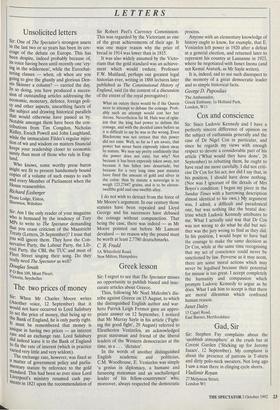The two prices of money
Sir: When Mr Charles Moore writes (Another voice, 12 September) that it would not have occurred to Lord Salisbury to set the price of money, that being up to the Bank of England, he is only partly right. It must be remembered that money is unique in having two prices — an interest rate and an exchange rate. Lord Salisbury did indeed leave it to the Bank of England to fix the rate of interest (which in prattice varied very little and very seldom). The exchange rate, however, was fixed as a matter of government policy and parlia- mentary statute by reference to the gold standard. This had been so ever since Lord Liverpool's ministry resumed cash pay- ments in 1821 upon the recommendation of Sir Robert Peel's Currency Commission. This was regarded by the Victorians as one of the great achievements of their age. It was one major reason why the price of bread in 1914 was lower than in 1815.
It was also widely assumed by the Victo- rians that the gold standard was an achieve- ment which would endure. Professor F.W. Maitland, perhaps our greatest legal historian ever, writing in 1888 lectures later published as The Constitutional History of England, said (in the context of a discussion of the extent of the royal prerogative) :
What an outcry there would be if the Queen were to attempt to debase the coinage. Prob- ably such an attempt would cost her her throne. Nevertheless Sir M. Hale was of opin- ion that the king had power to debase the coinage, and with the decided cases before us it is difficult to say he was in the wrong. Even Blackstone was not certain that this power did not exist. Well, so far as I am aware, that power has never been expressly taken away by statute. We may say pretty confidently that the power does not exist, but why? Not because it has been expressly taken away, not because it has fallen into desuetude, but because for a very long time past statutes have fixed the amount of gold and silver in the coins: thus by statute a sovereign is to weigh 123.27447 grains, and is to be eleven- twelfths gold and one-twelfth alloy.
I do not wish to detract from the force of Mr Moore's argument. In our century those statutes have been repealed and Lloyd George and his successors have debased the coinage without compunction. That being the case, there was indeed — as Mr Moore pointed out before Mr Lamont devalued — no reason why the pound must be worth at least 2.7780 deutschmarks.
C. R. Fradd
5A Whitefield Road, New Milton, Hampshire


















































 Previous page
Previous page